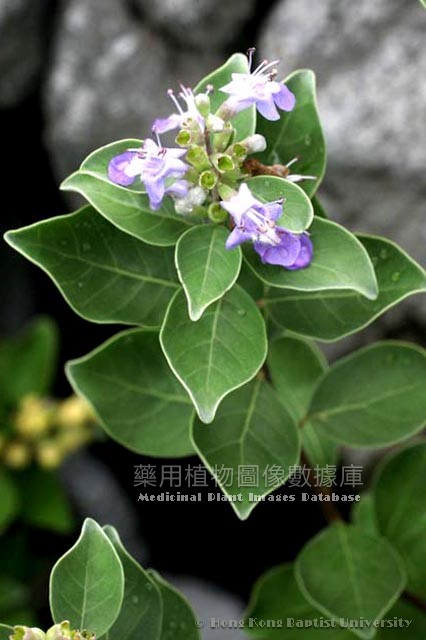|
|
|
Vitex rotundifolia L. f.

|
English Name |
Simpleleaf Shrub Chastetree, Beech Vitex |
|
Latin name |
Vitex rotundifolia L. f. |
|
Family & Genus |
Verbenaceae, Vitex |
|
Description |
A variant of vitex trifolia, stem is a crawler, joint usually grown with adventitious roots. Simple leaf opposite, lamina invert ovate or nearly round, usually blunt round or with short tip on the top, basal part wedge shaped, entire, 2.5-5cm long, 1.5-3cm wide. Morphology of flower and fruit equal to original species. Flowering: July to August, fruiting: August to October. |
|
Distribution |
Growing on sandy beaches, seasides and lakesides. Distributed in Liaoning, Hebei, Shandong, Jiangsu, Anhui, Zhejiang, Jiangxi, Fujian, Taiwan and Guangdong. Also distributed in Japan, India, Burma, Thailand, Vietnam, Malaysia, Australia and New Zealand. The medicinal materials are mainly produced in Shandong, Jiangxi, Zhejiang, Fujian and etc. |
|
Part Used |
Medical part: dried mature fruits. Chinese name: Manjingzi. |
|
Harvest & Processing |
Collected when fruits mature in autumn, removed impurities, and sun-dried. |
|
Chemistry |
Mainly contains essential oils, trace quantity of alkaloids, vitamin A and mangiferone. |
|
Pharmacology |
Antimicrobial, pain-killing, anti-inflammatory, blood-pressure-lowering, anti-freezing, phlegm-eliminating and pant-calming; toxic. |
|
Properties & Actions |
Pungent, bitter, little cold.Dispersing wind-heat, benefiting the head and eyes. |
|
Indications & Usage |
Headaches due to wind-heat type common cold, swelling pain in the gums, conjunctival congestion and delacrimation, dark and blurred vision, lightheadedness and dizziness.Oral administration: decocting, 6-10g; or made as medicinal liquor, pills or powders. External application: appropriate amount, decocted for washing. |
|
Examples |
1. Treat common cold and headache: shrub chastetree seed, common perilla leaves, mint, angelica dahurica, common chrysanthemum 9g each. Decoct in water and swallow.
2. Treat wind heat pain of eyes and head caused by exogenous pathogenic factors: shrub chastetree seed 9g, white mulberry leaves, common chrysanthemum, mint, angelica dahurica, catnip seed 9g each. Decoct in water and swallow.
3. Treat hemicrania: shrub chastetree seed 10g, common chrysanthemum 8g, szechwan lovage rhizome ligusticum 4g, wild ginger 3g, ural licorice 4g, angelica 3g. Add into 500 ml water and decoct until reduced to 200 ml, drink 3 times a day in several times. |
|
Permanent URL:https://sys01.lib.hkbu.edu.hk/cmed/mpid/detail.php?herb_id=D00495 |
|
|
|

